30th Annual Ira C. Rothgerber Jr. Conference Explores ‘The Legacy of U.S. Slavery’
Scholars, lawyers, community leaders, students and activists from across the country gathered on April 8, 2022 for the University of Colorado Law School’s 30th Annual Ira C. Rothgerber Jr. Conference: Looking Back to Move Forward: Exploring the Legacy of U.S. Slavery. This year’s conference built upon Colorado Law Dean Lolita Buckner Inniss’s book, “The Princeton Fugitive Slave: The Trials of James Collins Johnson.” Speakers throughout the conference examined the realities and repercussions of slavery and the impacts that echo through our society today.

The conference also highlighted the impact of the legacy of slavery on people’s day-to-day experiences. On April 7th, Motus Theater presented JustUs: Stories from the Frontlines of the Criminal Legal System and the Legacy of Systemic Racism and Slavery. The JustUs program included monologues by formerly incarcerated persons, with musical reactions to their monologues performed by Spirit of Grace and a poetry reading by Dominique Christina, an acclaimed writer, performer and social activist. The monologists from Motus Theater - Dereck Bell (pictured in photograph by Noah Katz on the right), Juaquin Mobley, and Colette Payne - told their personal stories leading up to their incarceration and their experiences while incarcerated. Professor Malveaux joined Dereck Bell in the telling of his story, an experience which she described as a gift. The JustUs performances provided a powerful framework and grounding for the panels the following day.
The conference opened with a discussion of The Princeton Fugitive Slave between Dean Inniss and Dr. Hilary Green, an Associate Professor of History in the Department of Gender and Race Studies at the University of Alabama. Dean Inniss described the research process and the difficulties she faced in bringing justice to James Collins’ story.
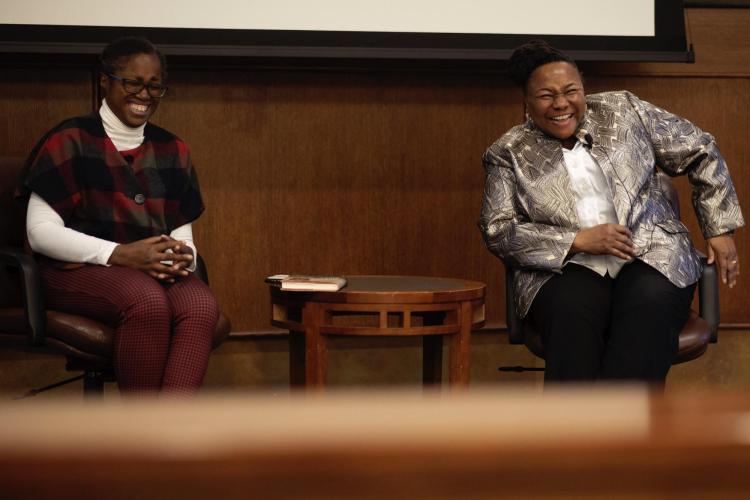
“These archives were not set up to record these lives,” responded Green, highlighting an important theme of the conference.
The book chat was followed by a roundtable discussion, “The 1921 Tulsa Race Massacre: The Quest for Accountability.” The roundtable reunited members of the original team who brought constitutional claims over two decades ago to recount the history of the 1921 Tulsa Race Massacre and discuss past and future efforts to bring this history to light, to make victims whole, and to hold the government accountable.
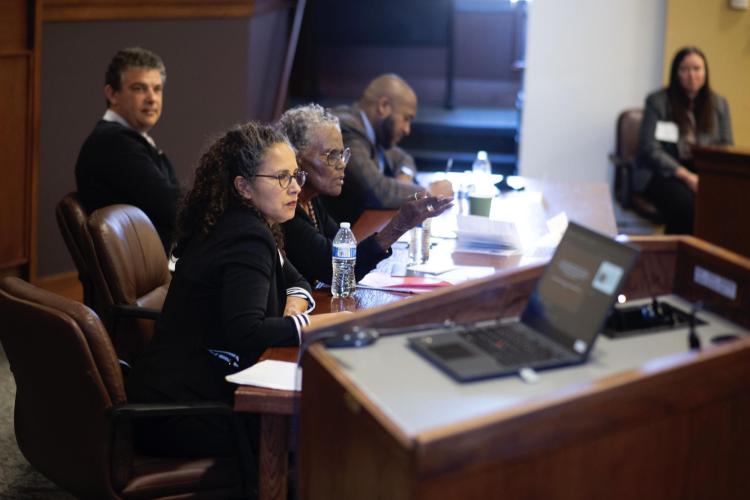
Moderator: Professor Suzette Malveaux (Colorado Law), Professor Emerita Adjoa Aiyetoro (William H. Bowen School of Law), Professor Eric Miller (Loyola Law School), Reverend Robert Turner (former pastor of Historic AME Church in Tulsa)
Three panels organized by the Byron White Center elaborated on these themes.
The first panel, titled “Institutional Complicity in American Slavery: The Role of the Judiciary and Higher Education,” explored the role the judiciary and higher educational institutions played in upholding and perpetuating slavery and its legacy, and investigated the forgotten histories of those whose stories were never told.
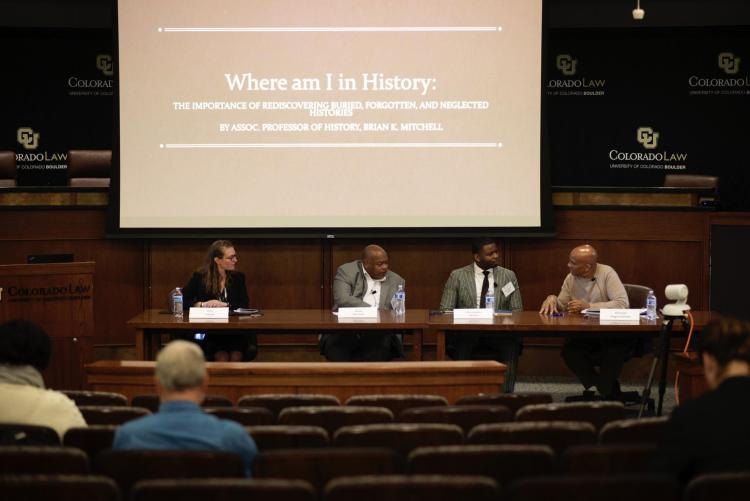
Moderator: Erin Vanek (Colorado Law '22), Professor Brian Mitchell (University of Arkansas at Little Rock), Professor Christopher Mathis (University of Iowa College of Law - visiting), Professor Michael Higginbotham (University of Baltimore Law School)
The second panel, “Vestiges of Slavery in the Criminal Justice System,” explored the impact of slavery in the modern criminal justice system, including the role that slave law played in shaping criminal law, systemic racism, disparate policing, and collateral consequences of incarceration.
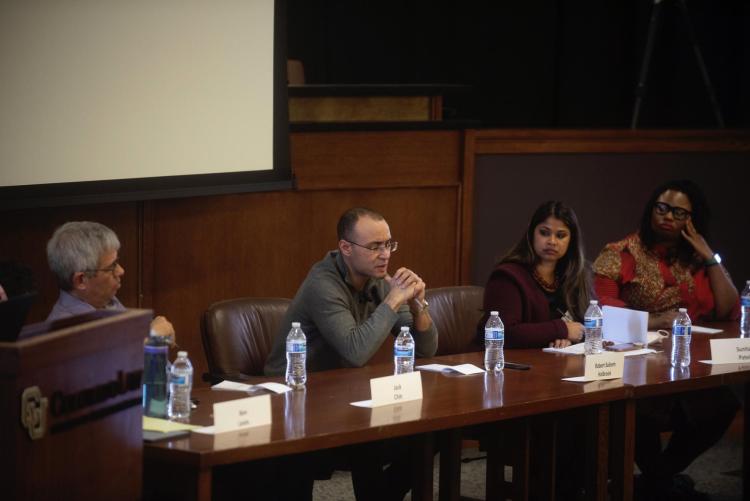
Professor Jack Chin (UC Davis School of Law), Robert Saleem Holbrook (Executive Director of the Abolition Law Center, Penn Law), Professor Sunita Patel (UCLA School of Law), Professor Monica Bell (Yale Law)
The third panel, “Bringing It Home: How Slavery Impacts Property and Land Ownership in Colorado Today,” explored how the history of slavery impacts modern day property laws and land ownership opportunities in Denver through housing discrimination, zoning, districting, and affordable housing.
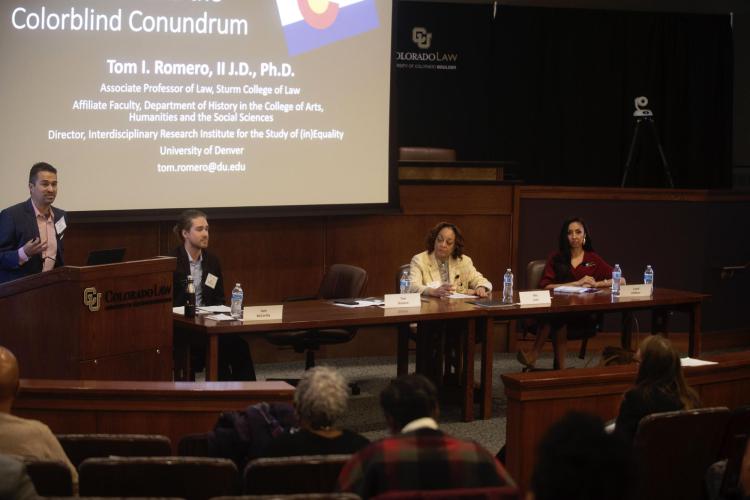
Professor Tom Romero (University of Denver Sturm College of Law), Moderator: Sam McCarthy (Colorado Law '23), Rita R. Lewis (former Executive Director- Denver Metro Fair Housing Center), Councilwoman Candi CdeBaca (Denver District 9)
Closing remarks were provided by Professor Reiland Rabaka, a Professor of African, African American, and Caribbean Studies in the University of Colorado and the Department of Ethnic Studies and the Founding Director of the Center for African & African American Studies. Rabaka emphasized the importance of having discussions like the ones held at the conference, adding, “This is what decolonization looks like.”
After the conclusion of the conference, panelists, staff, attendees, and student fellows celebrated in true Boulder fashion—enjoying a wonderful dinner together and a group hike at Chautauqua Park.
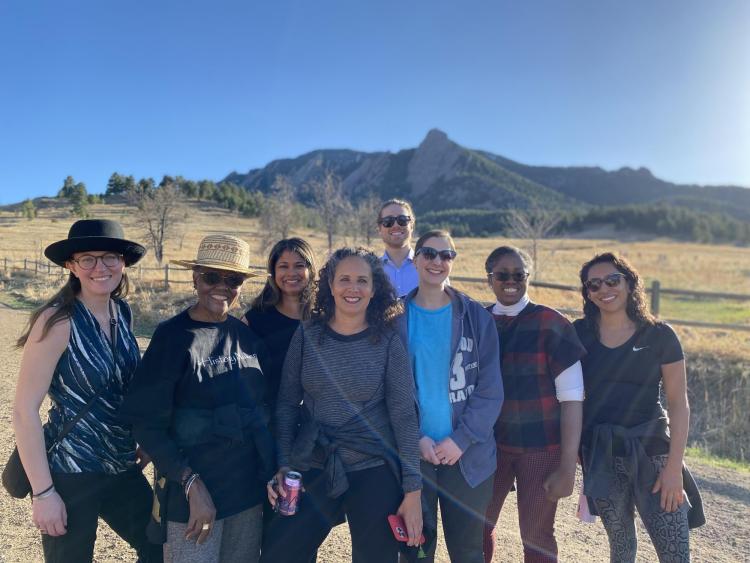
A full recording of the conference is available on YouTube.
Selected remarks and articles from the conference will be published in the upcoming Rothgerber Symposium issue of the University of Colorado Law Review’s 94th Volume, to be published in January 2023.
Biographies of all panel participants can be found here in the event's program.


